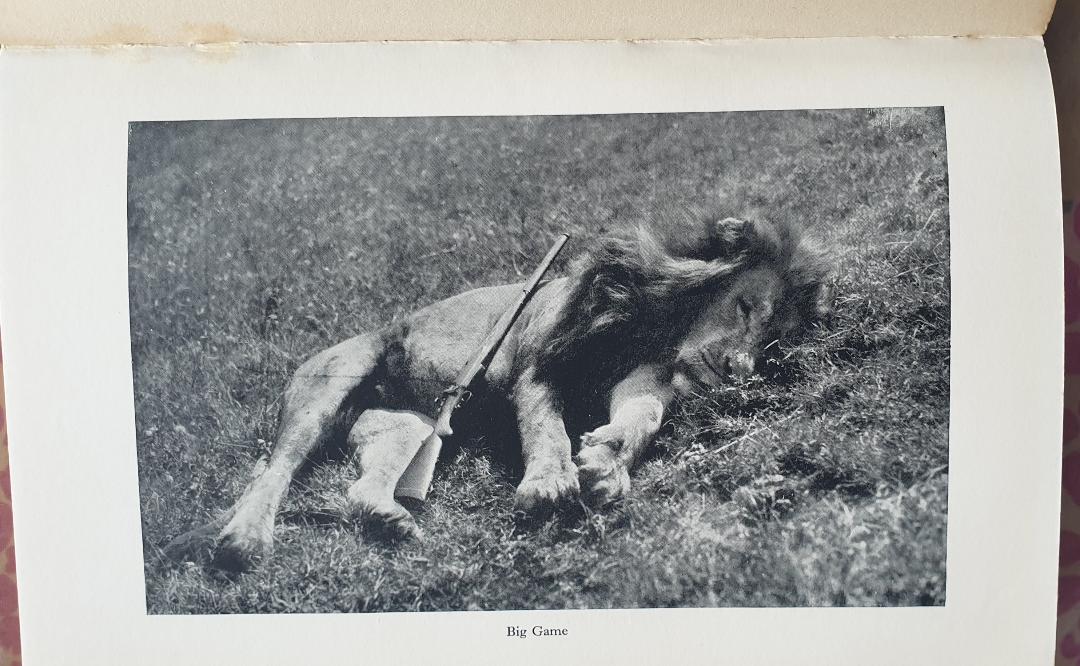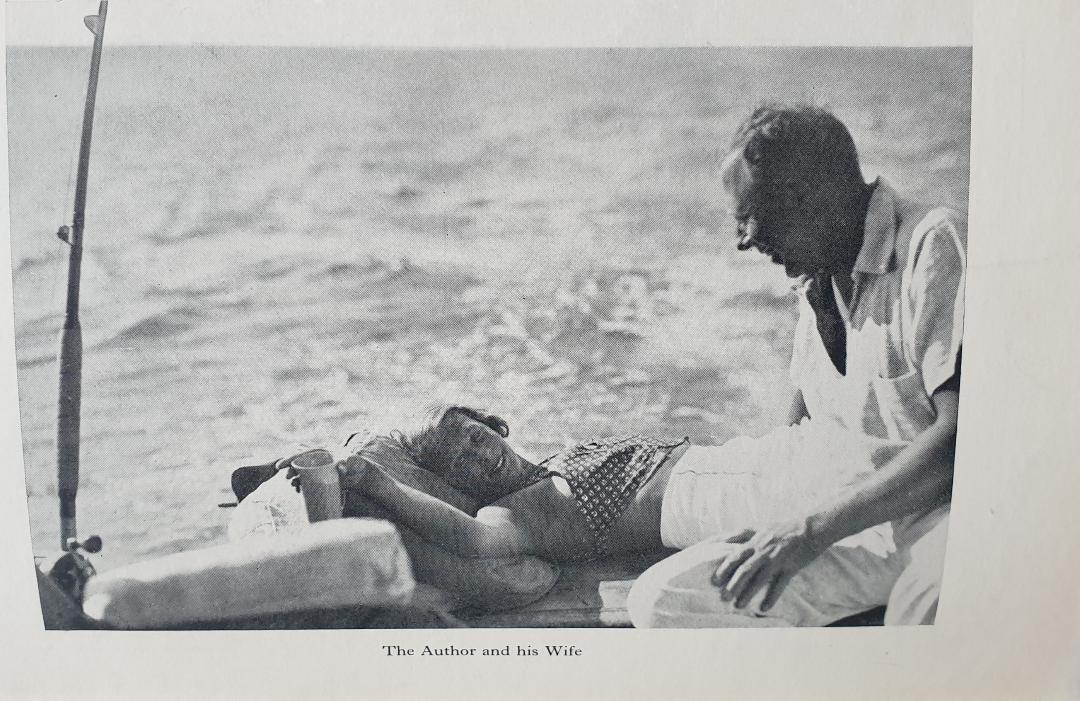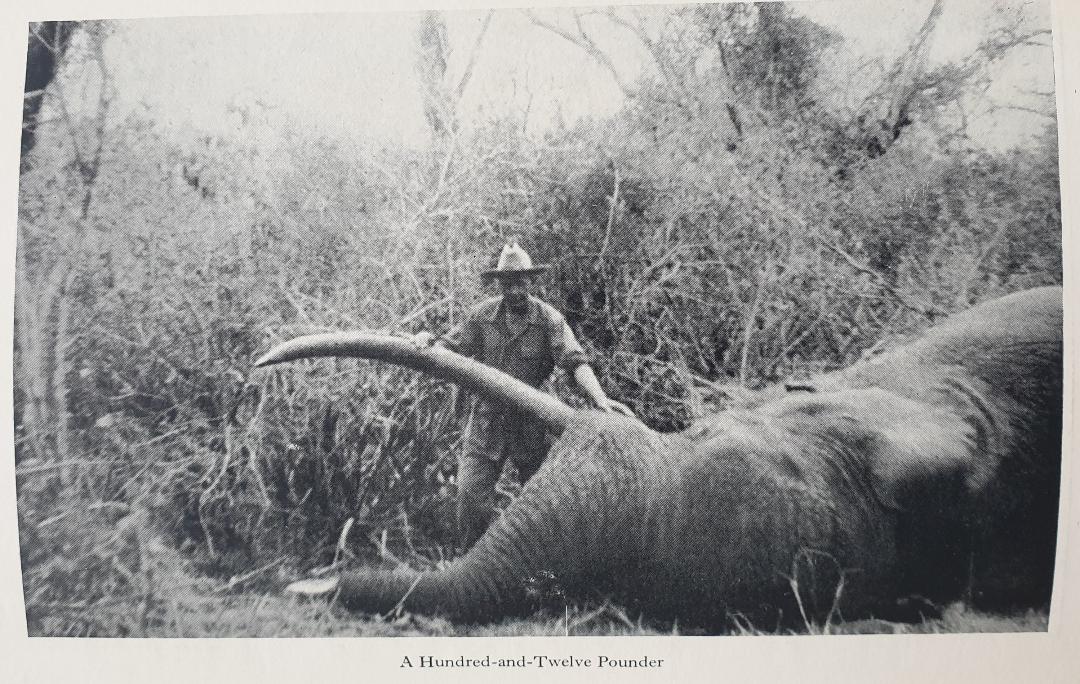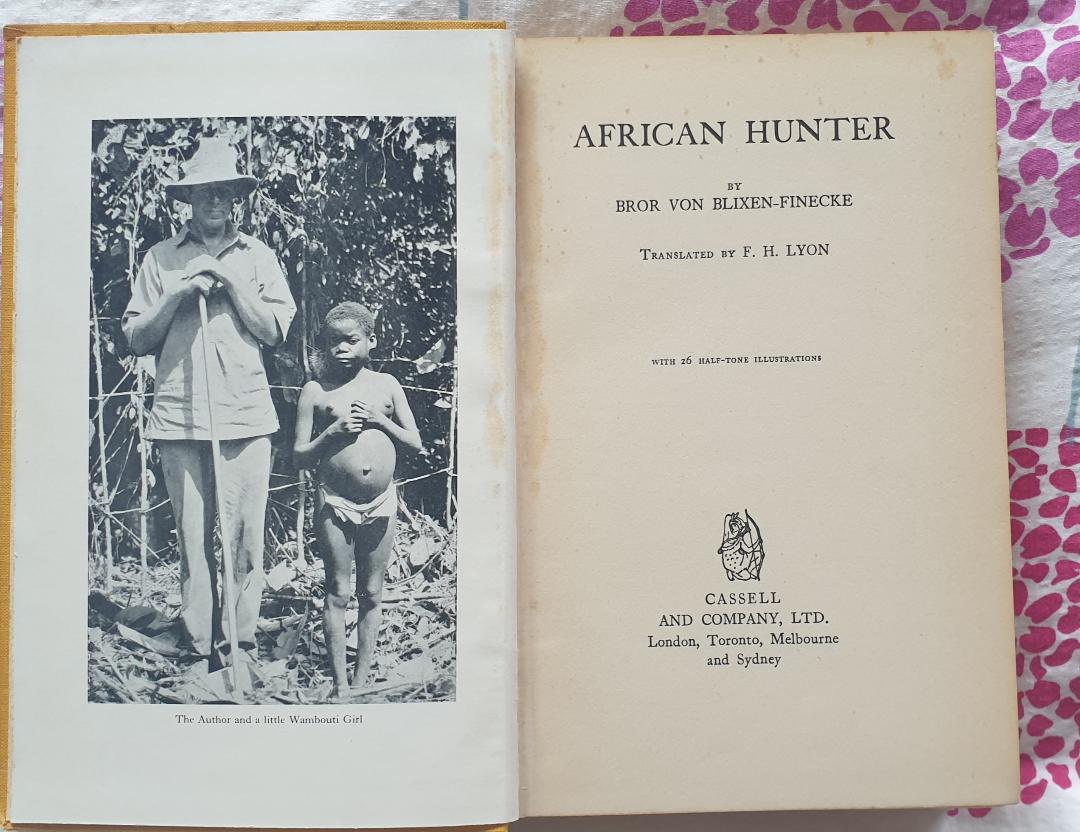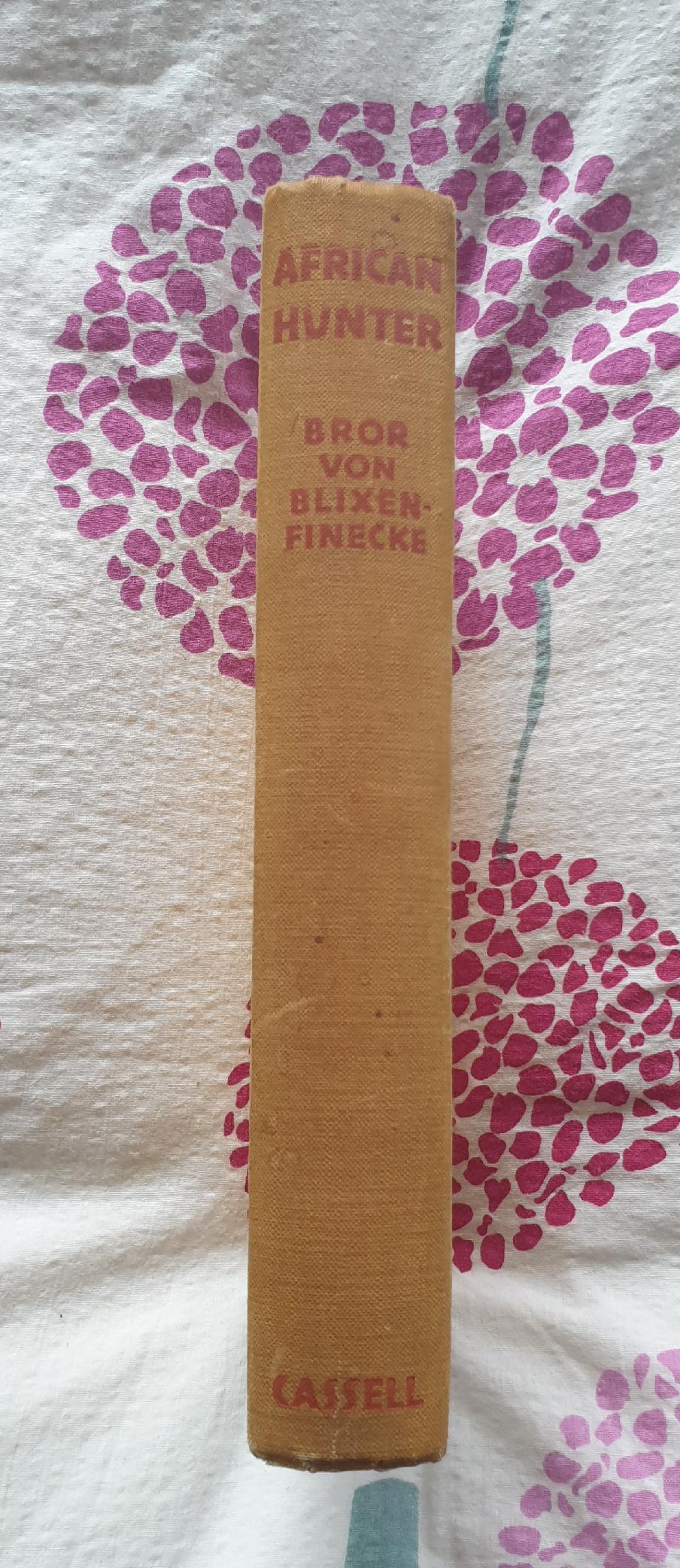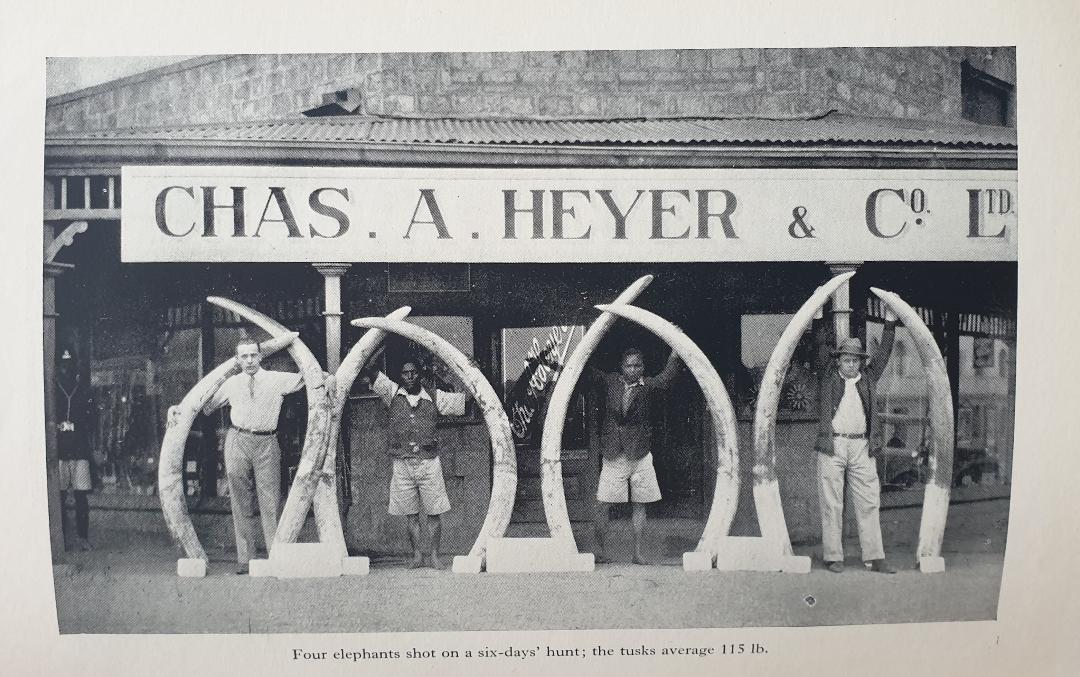monish
AH elite
Baron Bror von Blixen-Finecke (1886 - 1946), a Swedish Baron, Writer and African Big Game Hunter

Baron Bror von Blixen-Finecke (1886 - 1946)
Born to an aristocratic Swedish family, Baron Bror von Blixen-Finecke was born in 1886. His family background was two old noble families. His mother, Clara, was countess Krag-Juel-Vind-Frijs who grew up on the Denmark's largest estate, Frijsenborg. His father was baron Frederik von Blixen-Finecke, heir to the Dallund estate in Denmark and the Näsbyholm estate in southern Sweden.
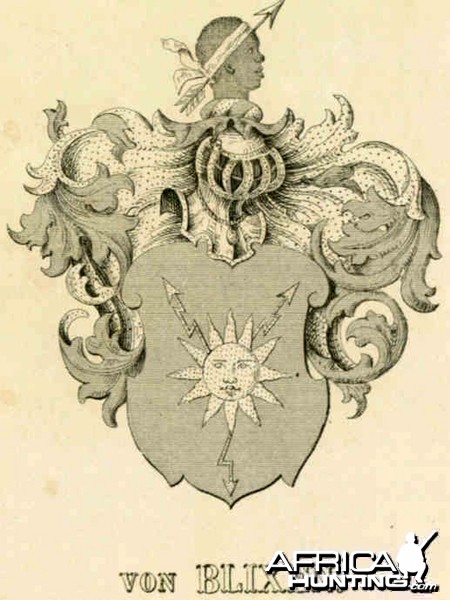
Baron Bror von Blixen-Finecke Coat of Arms.
He married his Danish second-cousin Karen Blixen (better known by her pen name Isak Dinesen) in 1913. The couple then moved to Kenya, where they bought a coffee plantation. The American writer Ernest Hemingway wrote about Bror Blixen: ”The Baron was not a man that you forget.”
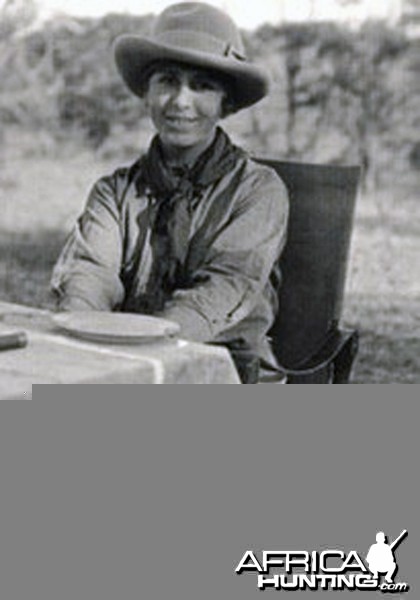
Karen Blixen (1885-1962), Wife of Baron Bror Blixen (divorced in 1925) and Author of the autobiography novel Out of Africa.

1930's, Bror von Blixen-Finecke on safari with his third wife, Eva Dickson, first woman to have ever crossed the Sahara by automobile.
Bror's identical twin, Hans, died in a plane crash in 1917.
Bror hated the trivialities of repetition. Whether in love or work. He was not cut out for the quiet life at home, nor to stick to only one woman. His immense vitality and energy required constant challenges for his mind and courage. The marriage with Karen did not last.

Karen and Bror Blixen
After the break-up from Karen in 1922, Bror was stripped of everything except his guns. His creditors' hunt for him was so intense that he was forced to hide himself in the bush near Isoli. But then his close friend, the governor, Sir Robert Coryndon intervened and referred some friends of his who wanted to go on safari to Bror.
In the middle of the night, Sir Robert drove his friends into the camp and woke up Bror. ”I want you to take my wife and me on a safari from the East coast to the West coast. By compass, you understand, the straight way. Imagine a ruler on a map …” Quietly Bror explained to the hothead, there are no straight roads in Africa. ”Then we will cut our way through”, the man replied. In spite of his crazy idea, he appeared to Bror as a man of reason. Was he aware that it would be an extremely time consuming project? ”I have got two years, that ought to do”, replied Sir Charles Markham. Salary for two years! It was like a heavenly gift for Bror. Together with the Markham couple, Bror travelled to Uganda and Congo, he hiked along Lake Victoria, north to Lake Rudolph, and through Ethiopia.
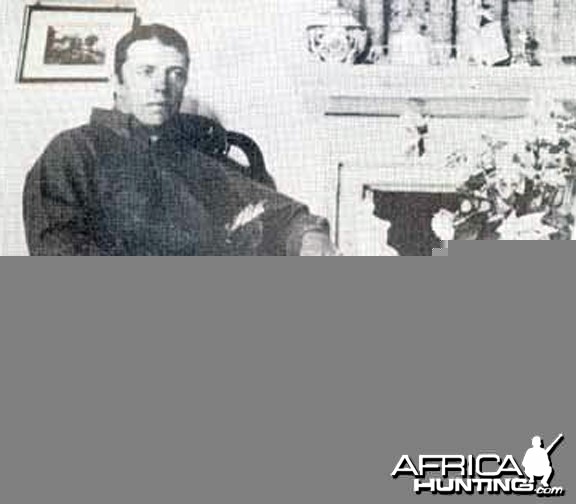
Baron Bror von Blixen-Finecke a Professional White Hunter.
This safari was the start of Bror's professional career as a white hunter and of a life-long friendship with Charles Markham. The two friends made several expeditions together. Including a five-month long expedition where they collected and registered fish and plants from the Congo and Chari rivers for the British Museum of Natural History. The trip from Bangui to N'djamena in Chad had been a fatiguing affair, full of hardships. They were both set on getting to Europe as quickly as possible. They then got the idea that they could save a lot of time by going due north through the Sahara desert the direct route to Algiers by motorcar! They bought a truck without having even seen it. The governor of Chad did all he could to talk them out of the project. The vehicle, an International Delivery Truck, was a standard model built for the roads of USA not for desert driving. In order to be suitable for ploughing through the sand dunes of the Sahara, the truck should have been specially built with extra large coolers, wide tires, six-wheel traction, and a reduction gear. Additionally, it was the wrong time of year with frequent sandstorms and dried out water holes. The more the governor spoke against the venture, the more intriguing the two gentlemen found the Sahara.
It took the two daredevils 16 days to complete the 4,535 kilometers from Kano to Algiers, straight across the Sahara where daytime temperatures hovered around 50º C in the shade. They lost their way and they nearly died of thirst, but after having traversed the Atlas Mountains, they safely reached Algiers.
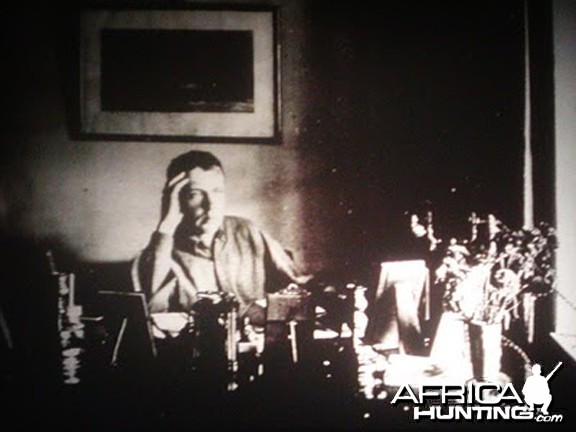
Baron Bror von Blixen-Finecke was a Swedish Baron, Writer and African Big Game Hunter.
Bror's philandering was said to have led to his wife's contracting syphilis, although recent sources claim that Karen was the one who was infected, during her years in Paris.[citation needed] Karen Blixen complained over a suspected malaria infection before ever going to Africa. Her beloved father Wilhelm Dinesen also suffered syphilis.
Although the couple were divorced in 1925 (with Karen retaining the coffee plantation that had been financed by her parents), shortly before her death she was quoted as saying, "If I could wish anything back of my life, it would be to go on safari once again with Bror..."
For many years Blixen ran a firm of safari guides, and among his clients was Edward, Prince of Wales. "Hunting with Blix was a magnificent experience," said one client. "With his quiet, almost lyrical narrative of what happened around us he got nature to live like I have never experienced since (from The Man Whom Women Loved, a biography of Blixen written by his godson Ulf Aschan)." He was also a talented writer; his best-known book was his autobiography, African Hunter (1938).
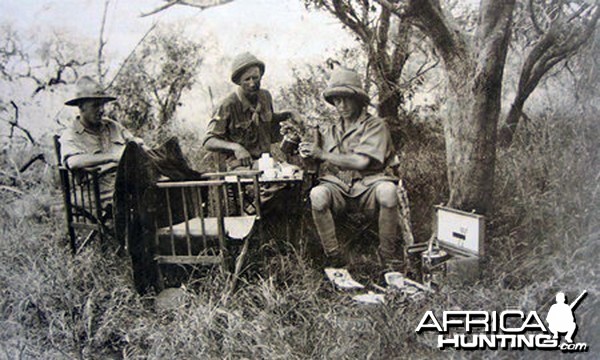
From left to right, Baron Bror von Blixen, Denys Finch Hatton and the Prince of Whales who he had the honor to guide during his Tanganyika safari in 1928.
Blixen left Africa in 1938 and returned to his native Sweden, where he died, in 1946, at the age of 59, following the crash of a car in which he was a passenger, in the village of Gardstanga.
According to Beryl Markham, "Bror was the toughest, most durable white hunter ever to snicker at the fanfare of safari or to shoot a charging buffalo between the eyes while debating whether his sundown drink would be gin or whiskey... The mould has been broken."
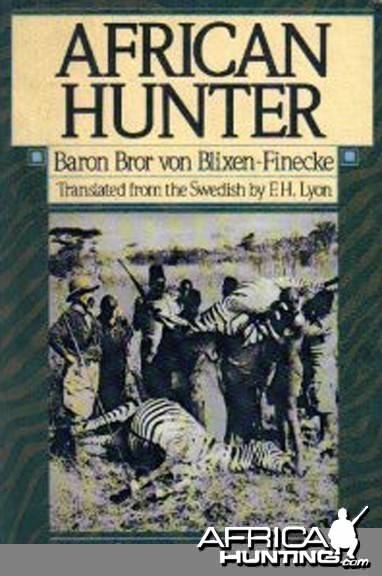
African Hunter by Peter Capstick
The role of Bror von Blixen-Finecke was played by Austrian actor Klaus Maria Brandauer in the Oscar-winning film, Out of Africa (1985).
Another Great White Hunter of the yesteryears...
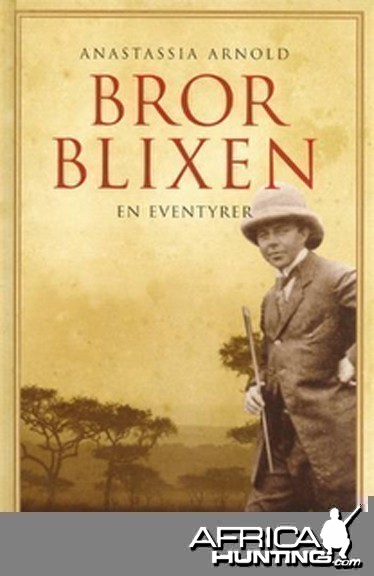
Biography of "Bror Blixen, an adventurer".
Monish
Bror Blixen - adventurer and white hunter
From Sweden to Kenya
by Anastassia Arnold
The American writer Ernest Hemingway wrote about Bror Blixen: ”The Baron was not a man that you forget.”
Baron Bror von Blixen-Finecke was born in 1886. His family background was two old noble families. His mother, Clara, was countess Krag-Juel-Vind-Frijs who grew up on the Denmark's largest estate, Frijsenborg. His father was baron Frederik von Blixen-Finecke, heir to the Dallund estate in Denmark and the Näsbyholm estate in southern Sweden. The von Blixen-Finecke family is able to trace its origins as far back as 1239. (Some two hundred and fifty years prior to Columbus' discovery of America in 1492.) As the third son of a noble family, Bror had no family obligations. It was his older brother, Carl's duty to carry on the family estate. As long as Bror found himself a way to make a living, the family was happy. As a start, Bror finished an education as farmer and he subsequently became the manager of Stjärneholm, the home farm of the Näsbyholm estate.
Bror was an accomplished cattleman, but life on Stjärneholm soon became too boring for him. As soon as Bror was old enough to handle a gun, he eagerly pursued the Blixen-Finecke family's hunting and shooting traditions. Näsbyholm was famous for offering the best shooting in all of Scandinavia, and members of the royal families in both Denmark and Sweden often came shooting on the estate. The young Bror knew of nothing better than ”the freedom of the fields and woods, the joy in wandering about at will, without compulsion, and observing the wild things and scenery, causes a strange singing in the blood – it's a tune one never forgets, which no school discipline can drive out of one's mind.” Bror recalls in his book African Hunter.
Bror's twin brother, Hans, was his regular hunting companion. Their first prey was hares, which they sold to the local butcher. The proceeds were quickly spent.
Later Bror stated that he thought he would probably have remained manager of Stjärneholm if he had not become engaged to his half cousin, Karen Dinesen. ”Between us we built up in our imagination a future in which everything but the impossible had a place”, Bror recalls.
Their plans included all kinds of wild ideas about emigration to Malacca or Russia, until one time when they visited Bror's uncle, count Mogens Krag-Juel-Vind-Frijs at Frijsenborg. He had just come home from a safari to Kenya. The more count Mogens told them about Kenya, the more they become determined to go there. According to what people told them, it was easy to make a fortune on farming in Kenya.
The night before Christmas Eve 1912, the engagement between baron Bror von Blixen-Finecke and Karen Dinesen was declared. In the spring of 1913 Bror sailed from Italy bound for Mombassa. From there he rode the train to Nairobi. The African landscape was beautiful, but it was the abundance of game that made Bror feel like he had come to the Garden of Eden. ”One simply cannot believe ones eyes. The train plows its way forward across the plain between whole regiments of giraffes, gnu, antelopes, graceful gazelles (Grant’s and Thompson’s), ostriches, and zebras… − Only a few hundred yards to the southward a big heard of elephants is galloping along, and among them a rhinoceros.”
In the highland outside Nairobi, Bror purchased the Mbagathi coffee farm and then sent for Karen. On the 14th January 1914, the day after Karen had arrived Mombassa by boat, she and Bror got married at a simple ceremony with the Swedish prince Wilhelm as a prominent witness.
Honeymoon safari
Without a map, Bror and Karen Blixen started out from the Kijabe station on their first safari. Along they brought two heavily laden wagons, a light mule-drawn cart with a sunroof for themselves, Bror's servant Farah, a saise, whose job is was to look after their horses and mules, a young masai moran as a guide, the gun bearer Ismail, and the old cook Ismail who made up the rear, riding a mule.
The recent rains had cut deep furrows in the dirt road, but when they reached the plains of the Kedong valley, the unrestricted views and the swarms of game after they had been driving through endless bush was breathtaking. The first camp was set up at the foot of Mount Souswa. The next day they passed through one of the most beautiful landscapes in Kenya. The heart of Masai country. The Kedong valley is surrounded by blue mountains: Mount Souswa with its long flat crater top, to the north Longenot with its two camel humps and furrowed slopes. And to the west, the Mau mountains rose from the plains with their primeval forests of cedar and olive trees.
After having shot all the ordinary species of antelopes, zebras and gnu, they focussed their attention on lions. In the cool darkness before sunrise they left camp together with their masai tracker heading for the direction where they heard lions roar during the night. The days went by without any success on the lions. Later on in life, Bror became famous for his ability to get lions for his clients. He was able to track lions where nobody else could find the slightest trace of them in the bush. But in his early safari days, he did not know enough about the habits of lions. Many years later, he stated that everything he knew about lions he learned from fostering the orphaned lion cub, Kom.
One day when they were out shooting meat for the camp, their saise came running for them. A male lion was taking a snooze on a riverbank near their camp. They hurried back, even though they were sure that the lion had disappeared by then. But it was still there. It lay completely still, watching them with its massive head resting on its forepaws. Bror quickly changed his gun. For a short moment the lion lifted its head and Bror immediately fired. The bullet struck the lion in the centre of the chest and it fell without uttering a sound.
In the evening the natives celebrated the demise of the lion with a Ngoma. Hesitantly a few of the young men started to dance. ”Little by little the circle of dancers widened. Rhythmic marching on the spot, interrupted by regular bounces either straight up or to the left or right. The warm bodies shining like bronze in the flickering light of the fire. The night was amazingly bright, and the stars were sparkling like never before”, Bror writes.
In Denmark Karen had taken part in hunting activities but she did not quite understand the hunters' enthusiasm for the hunt itself. But after four weeks on safari with Bror, she wrote an ecstatic letter to her brother, Thomas Dinesen, explaining about the intoxication of the hunt and about getting the big cats on one's brain.
On this, their honeymoon safari, Bror and Karen were full of happiness. Their life together was never to become so uncomplicated again. On a photograph taken on the safari, Bror and Karen stand closely together behind their trophies. They look like each other. Slim and suntanned, they are beaming with harmony.
Thirty years later, when a friend asked Karen Blixen what she wanted most in life, she replied without hesitation: ”Once again to go on safari with Bror”.
White hunter
Bror hated the trivialities of repetition. Whether in love or work. He was not cut out for the quiet life at home, nor to stick to only one woman. His immense vitality and energy required constant challenges for his mind and courage. The marriage with Karen did not last.
After the break-up from Karen in 1922, Bror was stripped of everything except his guns. His creditors' hunt for him was so intense that he was forced to hide himself in the bush near Isoli. But then his close friend, the governor, Sir Robert Coryndon intervened and referred some friends of his who wanted to go on safari to Bror.
In the middle of the night, Sir Robert drove his friends into the camp and woke up Bror. ”I want you to take my wife and me on a safari from the East coast to the West coast. By compass, you understand, the straight way. Imagine a ruler on a map …” Quietly Bror explained to the hothead, there are no straight roads in Africa. ”Then we will cut our way through”, the man replied. In spite of his crazy idea, he appeared to Bror as a man of reason. Was he aware that it would be an extremely time consuming project? ”I have got two years, that ought to do”, replied Sir Charles Markham. Salary for two years! It was like a heavenly gift for Bror. Together with the Markham couple, Bror travelled to Uganda and Congo, he hiked along Lake Victoria, north to Lake Rudolph, and through Ethiopia.
This safari was the start of Bror's professional career as a white hunter and of a life-long friendship with Charles Markham. The two friends made several expeditions together. Including a five-month long expedition where they collected and registered fish and plants from the Congo and Chari rivers for the British Museum of Natural History. The trip from Bangui to N'djamena in Chad had been a fatiguing affair, full of hardships. They were both set on getting to Europe as quickly as possible. They then got the idea that they could save a lot of time by going due north through the Sahara desert − the direct route to Algiers − by motorcar! They bought a truck without having even seen it. The governor of Chad did all he could to talk them out of the project. The vehicle, an International Delivery Truck, was a standard model built for the roads of USA − not for desert driving. In order to be suitable for ploughing through the sand dunes of the Sahara, the truck should have been specially built with extra large coolers, wide tires, six-wheel traction, and a reduction gear. Additionally, it was the wrong time of year with frequent sandstorms and dried out water holes. The more the governor spoke against the venture, the more intriguing the two gentlemen found the Sahara.
It took the two daredevils 16 days to complete the 4,535 kilometres from Kano to Algiers, straight across the Sahara where daytime temperatures hovered around 50º C in the shade. They lost their way and they nearly died of thirst, but after having traversed the Atlas mountains, they safely reached Algiers.
Beryl Markham and Bror
A close friend and partner was Beryl Markham. She became famous when was the first person ever (man or woman) to fly single-handed across the Atlantic from London to the USA. It was a worldwide sensation in 1936 when she landed on the easterly shores of Cape Breton of Nova Scotia.
Beryl grew up on her father's farm at Njoro in Kenya. She learned hunting techniques from her African playmates. In the course of her life she changed her career several times. From breeding racehorses to pilot, author, and then back to breeding racehorses in Kenya. As one of the first white hunters in Africa, Bror would use an airplane, piloted by Beryl, to locate game for clients.
Beryl found Bror's endurance almost scary. He could walk for weeks, even months, non-stop from dawn to dusk on the trail of an elephant. The only people who were able to keep up with him were the natives. The years in Africa left their mark on Bror. He suffered from several tropical deceases. From time to time he would fall in his tracks somewhere in the bush, shivering with malaria fever, only to be up and walking the next morning as if nothing had happened. ”With an appearance like the half brother of Death, but still capable of shooting as dead straight as always and doing his job with the usual professional competence”, Beryl Markham recalls.
Bror had acute senses and instincts. One glance at the sun, even when it was covered by clouds, and Bror knew exactly what time of day it was. Once, when Beryl flew Bror from Kenya to England in her small sports plane, he awoke from a slumber and exclaimed: ”I can smell Sudd!”, when they passed the Sudd papyrus swamps at high altitude. His sense of smell had awoken him. Even at an altitude of several hundred metres, he knew in his sleep exactly where they were!
The profession as white hunter was made for Bror. Here the skilled hunter, the pleasant party person, the eminent organiser, the ever restless, adventurous and fleeting womaniser all come together in one and the same person. Bror's aristocratic background gave him an extra advantage as most of his clients were either British upper class or wealthy Americans. The British felt that they were in the company of one of their equals, and the newly-rich Americans loved to be close to a member of the coveted aristocracy.
His looks, however, in no way lived up to the Hollywood image of the great white hunter. Bror was neither handsome with clear-cut features, nor silent and short-tempered. Nor did he adorn himself with the traditional white hunter's attributes, such as big knives, revolvers or binoculars. Bror was round-cheeked, talkative and pleasant to everybody. He never carried anything around unless he was actually in the process of hunting a prey – then he would always carry his own gun and ammunition. One thing, though, he did have in common with the white hunter hero of the movies: the almost magnetic attractiveness for women.
During the twenties and thirties, Bror became almost a living legend. His visits to European and American cities was always prominently publicised in the gossip columns of the local newspapers. The years that Bror − or Blix as his friends and clients called him – was active as a white hunter and safari guide were to become his best. The culmination of his life.
The Africans gave Bror the nickname "Wahoga". This means wild duck, and it was in reference partly to his slightly waddling gait, partly to his restlessness and unquenchable thirst for freedom and wandering. The natives immediately recognised that he was one of the great wanderers.
Bror gained a great deal of respect from his natives friends, they regarded his legendary endurance and abilities as a hunter as almost mythical. When he left Africa after 24 years, they regarded him as a 'raki sana': a great friend. Such respect, however, is not easily gained. You get it neither as a result of wealth or generosity, nor by acting as the defender of the natives'. Such respect is granted only to someone who has a greatness in his personality and who displays a large amount of courage in his actions.
The are plenty of examples of Bror's courage. One example is from a photo safari with a Swedish film photographer. In the 1920's the photo equipment was rather crude. It was necessary to bring the photographer up quite close to the game in order for it to look like something on the film. It was Bror's task to locate crocodiles, hippos, buffaloes and rhinoceroses and get them in as close to the camera as possible.
In order to give the photographer a shot of an attacking rhino, Bror crept up to it covered by a bush. He then slapped the drowsy rhino bull across its snout before jumping in to its field of vision, sprinting towards the film camera. One of the two accompanying hunters were then supposed to shoot the animal when it got too close to Bror. The plan obviously worked out!
On safari with the Prince of Wales
After the divorce from Karen Blixen, Bror married English Cockie Birkbeck. Cockie had lived her life among the upper class but was basically without means of her own. Just like Bror, she was a lively and carefree soul.
Many of Bror's safari clients became his close friends. Several of them lent him money and never got it back. But somehow it never seemed to have any influence on their friendships. Like one client friend once said: ”In the company of Bror, I felt more alive than ever before. Everything was possible according to him. He turned one's wildest dreams into reality. So what matters a little money in relation to this!”
One client, major Edward Cooper, insisted that he wanted to hunt lions with a bow an arrow. It was more sporting and fair to the lion than using a rifle, the newly arrived client lectured Bror. Bror's scepticism was abruptly dismissed by Cooper. It was bow and arrow, period! After wounding a lion, it attacked Cooper when it was stopped by a well-placed bullet from Bror's rifle. Cooper subsequently forgot all about hunting with bow and arrow − but never his gratitude towards Bror for saving his life.
On Bror's recommendation, Cooper later bought a farm, Singu Estate, in Tanzania. Singu Estate was situated ten miles outside Babathi village in the Pinaars Heights, 3000 feet above sea level. The nearest town, Arusha, was more than one hundred miles away. Cooper appointed Bror as manager of the farm where he and Cockie moved into a mud-built hut, their temporary home. Later Bror built a wooden house with three rooms for them. There was no water or toilet in the house, and when they had guests (which they often did), they camped outside the house. In the following years, Bror divided his time between ploughing up new land, running the farm, and being away on months-long safaris in order to make extra money.
In November of 1928, the Prince of Wales − who later, for a short period of time, was to become King Edward VIII before he abdicated in favour of life together with Mrs. Wallis Simpson – came on an official visit to Kenya together with his brother, Prince Henry. After the official visit, the two princes came to Arusha in order to go hunting. Prince Edward himself contacted Bror and asked him for his assistance in bagging a lion. The leader of Prince Edward's safari, Denys Finch Hatton, had told the prince that Bror was the best lion man in all of Africa. Would Bror care to join the safari? Bror accepted the proposal on the spot.
The professional hunters stopped at nothing to find a lion for the prince. In a landscape dominated by tall grass, they discovered a male lion. Bror knew that it was now or never so he went into the thicket alone in an attempt to scare the lion out by means of loud shouts and clapping of the hands. Prince Edward got his lion, and the heir to the Throne was suitably impressed by Bror's fearlessness. In his diary from the safari, Sport and Travel in East Africa, the prince writes that Bror's "attitude towards lions is that of the prophet Daniel”.
In 1930 Prince Edward returned to Kenya, this time the main object was elephant. In Jipi near the Paré mountains, they came upon the tracks of a very large elephant bull with exceptionally large tusks. For four days, Bror, Denys Finch Hatton and the prince tracked the elephant in a fearful heat. ”The spoor positively smelt of him, but we had not seen him”. On the fourth day, Denys spotted the elephant. When the prince stalked up close, he accidentally stepped on a dry twig. When it snapped, "the set off at full speed at a rate of forty miles an hour and was gone before we could count three”. Devastated the three hunters fell to the ground.
Bror was fascinated by elephant hunting. Against elephant the odds are mostly in your disfavour. Partly because of the physical advantages of the elephant, partly because of its intelligence and ability to react. ”Just like the buffalo, the elephant reflects on the situation and draws its conclusions that rarely are wrong”. There were occasions where Bror seriously doubted who was hunting whom when, totally exhausted, he was staggering along on the spoor of an elephant for the third consecutive month.
After the royal safaris, Bror's reputation sky rocketed. Everybody wanted to go on safari with Prince Edward's professional hunter. Together with Phillip Percival, also known as Pop, Bror formed the safari company Tanganyika Guides. Blix and Pop were in a class of their own. They charged up to 150 or 200 Pounds per month where others gladly accepted half that. Tanganyika Guides only knew two categories of safaris. First class safaris where the clients had up to three aeroplanes and a huge staff of people at their disposal. No effort was spared to fulfil the clients' wishes. Second class safaris were less lavish.
One of Tanganyika Guides' clients was Ernest Hemingway, who went on safari with Phillip Percival as his guide. On his return journey to Europe, Hemingway met Bror on the cruise liner "Gripsholm". The two men exchanged hunting stories on the ship's deck and in the bar. To Hemingway, Bror was the real thing compared to his own poor imitation of a big game hunter. The two men kept close contact through the rest of their lives – even though they rarely met in person. They did go on a fishing trip together once on Hemingway's boat, "Pilar", off Bimini Island – one of the Bahamas isles. On board with Bror was the new love of his life, the Swedish adventuress Eva Dickson. Young and attractive, Eva was the final straw for Cockie. Their marriage ended in yet a divorce for Bror.
Exit Africa
In 1938, Eva Dickson was tragically killed in a road accident near Baghdad. She had just set out on a record-breaking drive, single handed along the ancient Silk Route. Eva's death had a terrific impact on Bror. It was like the music had disappeared from his life. Not even safari life appealed to him any more. A former client, now a close friend, Winston Guest, was shocked by Bror's despondency. Should he buy a farm for Bror in Tanzania, or perhaps a small estate in Sweden, he asked Bror's nephew. Something definitely had to be done to bring Bror out of his misery. On the other hand, hanging on to property of any kind, or money, was an impossibility for Bror. They had to figure out something else.
Winston Guest rented the shooting rights on an estate on Gardiner’s Island – a small island outside New York City. Guest offered Bror a position as gamekeeper on the estate. His main job was to manage the pheasant rearing and to look after the wild geese that visited the island. Bror accepted the position. He needed a change of scenery. What he did not know at the time, was that he was never again to live in Africa. The most important period of his life, a period of 25 consecutive years in Africa, was history. The life as Wahoga lay behind him.
Ernest Hemingway came and stayed at Bror's place on Gardiner’s Island. They went shooting together on the island. New York was only a short flight away. Here Bror was a frequent guest at parties with people like the Vanderbilts, Barbara Hutton, Gloria Swanson, president Roosevelt, and many others.
The circle is completed
When the second world war broke out, Bror Blixen wanted to go back to Europe to do his part in the war. He managed to raise enough money in the States to buy a field hospital, which he brought across to Namsos in Norway. Here the war raged between the Germans and the Norwegians. The Germans, however, had the upper hand, and Bror and the hospital staff were forced to flee from the Germans across the border to Sweden.
Bror spent the remaining years of his life, from 1940 to 1946, in a small cottage on the Näsbyholm estate. The circle had been completed. Once again he went shooting on the family grounds – and he wrote a book about his years in Africa. About his respect for the natives and their knowledge of nature and their abilities as hunters, about the wildlife of Africa, about hunting with the Wambuti pygmies in the vast Ituri forest, about his wanderings in Ethiopia, Uganda, and Congo, and about crossing the mighty lake Chad and the endless Sahara desert.
In Tanzania they named a town after him. Wahoga. And fifty years later, when I visited Kenya and Tanzania to walk in his path, the natives still remembered him. His reputation and the power of his personality were as vivid as ever.

Baron Bror von Blixen-Finecke (1886 - 1946)
Born to an aristocratic Swedish family, Baron Bror von Blixen-Finecke was born in 1886. His family background was two old noble families. His mother, Clara, was countess Krag-Juel-Vind-Frijs who grew up on the Denmark's largest estate, Frijsenborg. His father was baron Frederik von Blixen-Finecke, heir to the Dallund estate in Denmark and the Näsbyholm estate in southern Sweden.
Baron Bror von Blixen-Finecke Coat of Arms.
He married his Danish second-cousin Karen Blixen (better known by her pen name Isak Dinesen) in 1913. The couple then moved to Kenya, where they bought a coffee plantation. The American writer Ernest Hemingway wrote about Bror Blixen: ”The Baron was not a man that you forget.”
Karen Blixen (1885-1962), Wife of Baron Bror Blixen (divorced in 1925) and Author of the autobiography novel Out of Africa.
1930's, Bror von Blixen-Finecke on safari with his third wife, Eva Dickson, first woman to have ever crossed the Sahara by automobile.
Bror's identical twin, Hans, died in a plane crash in 1917.
Bror hated the trivialities of repetition. Whether in love or work. He was not cut out for the quiet life at home, nor to stick to only one woman. His immense vitality and energy required constant challenges for his mind and courage. The marriage with Karen did not last.
Karen and Bror Blixen
After the break-up from Karen in 1922, Bror was stripped of everything except his guns. His creditors' hunt for him was so intense that he was forced to hide himself in the bush near Isoli. But then his close friend, the governor, Sir Robert Coryndon intervened and referred some friends of his who wanted to go on safari to Bror.
In the middle of the night, Sir Robert drove his friends into the camp and woke up Bror. ”I want you to take my wife and me on a safari from the East coast to the West coast. By compass, you understand, the straight way. Imagine a ruler on a map …” Quietly Bror explained to the hothead, there are no straight roads in Africa. ”Then we will cut our way through”, the man replied. In spite of his crazy idea, he appeared to Bror as a man of reason. Was he aware that it would be an extremely time consuming project? ”I have got two years, that ought to do”, replied Sir Charles Markham. Salary for two years! It was like a heavenly gift for Bror. Together with the Markham couple, Bror travelled to Uganda and Congo, he hiked along Lake Victoria, north to Lake Rudolph, and through Ethiopia.
Baron Bror von Blixen-Finecke a Professional White Hunter.
This safari was the start of Bror's professional career as a white hunter and of a life-long friendship with Charles Markham. The two friends made several expeditions together. Including a five-month long expedition where they collected and registered fish and plants from the Congo and Chari rivers for the British Museum of Natural History. The trip from Bangui to N'djamena in Chad had been a fatiguing affair, full of hardships. They were both set on getting to Europe as quickly as possible. They then got the idea that they could save a lot of time by going due north through the Sahara desert the direct route to Algiers by motorcar! They bought a truck without having even seen it. The governor of Chad did all he could to talk them out of the project. The vehicle, an International Delivery Truck, was a standard model built for the roads of USA not for desert driving. In order to be suitable for ploughing through the sand dunes of the Sahara, the truck should have been specially built with extra large coolers, wide tires, six-wheel traction, and a reduction gear. Additionally, it was the wrong time of year with frequent sandstorms and dried out water holes. The more the governor spoke against the venture, the more intriguing the two gentlemen found the Sahara.
It took the two daredevils 16 days to complete the 4,535 kilometers from Kano to Algiers, straight across the Sahara where daytime temperatures hovered around 50º C in the shade. They lost their way and they nearly died of thirst, but after having traversed the Atlas Mountains, they safely reached Algiers.
Baron Bror von Blixen-Finecke was a Swedish Baron, Writer and African Big Game Hunter.
Bror's philandering was said to have led to his wife's contracting syphilis, although recent sources claim that Karen was the one who was infected, during her years in Paris.[citation needed] Karen Blixen complained over a suspected malaria infection before ever going to Africa. Her beloved father Wilhelm Dinesen also suffered syphilis.
Although the couple were divorced in 1925 (with Karen retaining the coffee plantation that had been financed by her parents), shortly before her death she was quoted as saying, "If I could wish anything back of my life, it would be to go on safari once again with Bror..."
For many years Blixen ran a firm of safari guides, and among his clients was Edward, Prince of Wales. "Hunting with Blix was a magnificent experience," said one client. "With his quiet, almost lyrical narrative of what happened around us he got nature to live like I have never experienced since (from The Man Whom Women Loved, a biography of Blixen written by his godson Ulf Aschan)." He was also a talented writer; his best-known book was his autobiography, African Hunter (1938).
From left to right, Baron Bror von Blixen, Denys Finch Hatton and the Prince of Whales who he had the honor to guide during his Tanganyika safari in 1928.
Blixen left Africa in 1938 and returned to his native Sweden, where he died, in 1946, at the age of 59, following the crash of a car in which he was a passenger, in the village of Gardstanga.
According to Beryl Markham, "Bror was the toughest, most durable white hunter ever to snicker at the fanfare of safari or to shoot a charging buffalo between the eyes while debating whether his sundown drink would be gin or whiskey... The mould has been broken."
African Hunter by Peter Capstick
The role of Bror von Blixen-Finecke was played by Austrian actor Klaus Maria Brandauer in the Oscar-winning film, Out of Africa (1985).
Another Great White Hunter of the yesteryears...
Biography of "Bror Blixen, an adventurer".
Monish
Bror Blixen - adventurer and white hunter
From Sweden to Kenya
by Anastassia Arnold
The American writer Ernest Hemingway wrote about Bror Blixen: ”The Baron was not a man that you forget.”
Baron Bror von Blixen-Finecke was born in 1886. His family background was two old noble families. His mother, Clara, was countess Krag-Juel-Vind-Frijs who grew up on the Denmark's largest estate, Frijsenborg. His father was baron Frederik von Blixen-Finecke, heir to the Dallund estate in Denmark and the Näsbyholm estate in southern Sweden. The von Blixen-Finecke family is able to trace its origins as far back as 1239. (Some two hundred and fifty years prior to Columbus' discovery of America in 1492.) As the third son of a noble family, Bror had no family obligations. It was his older brother, Carl's duty to carry on the family estate. As long as Bror found himself a way to make a living, the family was happy. As a start, Bror finished an education as farmer and he subsequently became the manager of Stjärneholm, the home farm of the Näsbyholm estate.
Bror was an accomplished cattleman, but life on Stjärneholm soon became too boring for him. As soon as Bror was old enough to handle a gun, he eagerly pursued the Blixen-Finecke family's hunting and shooting traditions. Näsbyholm was famous for offering the best shooting in all of Scandinavia, and members of the royal families in both Denmark and Sweden often came shooting on the estate. The young Bror knew of nothing better than ”the freedom of the fields and woods, the joy in wandering about at will, without compulsion, and observing the wild things and scenery, causes a strange singing in the blood – it's a tune one never forgets, which no school discipline can drive out of one's mind.” Bror recalls in his book African Hunter.
Bror's twin brother, Hans, was his regular hunting companion. Their first prey was hares, which they sold to the local butcher. The proceeds were quickly spent.
Later Bror stated that he thought he would probably have remained manager of Stjärneholm if he had not become engaged to his half cousin, Karen Dinesen. ”Between us we built up in our imagination a future in which everything but the impossible had a place”, Bror recalls.
Their plans included all kinds of wild ideas about emigration to Malacca or Russia, until one time when they visited Bror's uncle, count Mogens Krag-Juel-Vind-Frijs at Frijsenborg. He had just come home from a safari to Kenya. The more count Mogens told them about Kenya, the more they become determined to go there. According to what people told them, it was easy to make a fortune on farming in Kenya.
The night before Christmas Eve 1912, the engagement between baron Bror von Blixen-Finecke and Karen Dinesen was declared. In the spring of 1913 Bror sailed from Italy bound for Mombassa. From there he rode the train to Nairobi. The African landscape was beautiful, but it was the abundance of game that made Bror feel like he had come to the Garden of Eden. ”One simply cannot believe ones eyes. The train plows its way forward across the plain between whole regiments of giraffes, gnu, antelopes, graceful gazelles (Grant’s and Thompson’s), ostriches, and zebras… − Only a few hundred yards to the southward a big heard of elephants is galloping along, and among them a rhinoceros.”
In the highland outside Nairobi, Bror purchased the Mbagathi coffee farm and then sent for Karen. On the 14th January 1914, the day after Karen had arrived Mombassa by boat, she and Bror got married at a simple ceremony with the Swedish prince Wilhelm as a prominent witness.
Honeymoon safari
Without a map, Bror and Karen Blixen started out from the Kijabe station on their first safari. Along they brought two heavily laden wagons, a light mule-drawn cart with a sunroof for themselves, Bror's servant Farah, a saise, whose job is was to look after their horses and mules, a young masai moran as a guide, the gun bearer Ismail, and the old cook Ismail who made up the rear, riding a mule.
The recent rains had cut deep furrows in the dirt road, but when they reached the plains of the Kedong valley, the unrestricted views and the swarms of game after they had been driving through endless bush was breathtaking. The first camp was set up at the foot of Mount Souswa. The next day they passed through one of the most beautiful landscapes in Kenya. The heart of Masai country. The Kedong valley is surrounded by blue mountains: Mount Souswa with its long flat crater top, to the north Longenot with its two camel humps and furrowed slopes. And to the west, the Mau mountains rose from the plains with their primeval forests of cedar and olive trees.
After having shot all the ordinary species of antelopes, zebras and gnu, they focussed their attention on lions. In the cool darkness before sunrise they left camp together with their masai tracker heading for the direction where they heard lions roar during the night. The days went by without any success on the lions. Later on in life, Bror became famous for his ability to get lions for his clients. He was able to track lions where nobody else could find the slightest trace of them in the bush. But in his early safari days, he did not know enough about the habits of lions. Many years later, he stated that everything he knew about lions he learned from fostering the orphaned lion cub, Kom.
One day when they were out shooting meat for the camp, their saise came running for them. A male lion was taking a snooze on a riverbank near their camp. They hurried back, even though they were sure that the lion had disappeared by then. But it was still there. It lay completely still, watching them with its massive head resting on its forepaws. Bror quickly changed his gun. For a short moment the lion lifted its head and Bror immediately fired. The bullet struck the lion in the centre of the chest and it fell without uttering a sound.
In the evening the natives celebrated the demise of the lion with a Ngoma. Hesitantly a few of the young men started to dance. ”Little by little the circle of dancers widened. Rhythmic marching on the spot, interrupted by regular bounces either straight up or to the left or right. The warm bodies shining like bronze in the flickering light of the fire. The night was amazingly bright, and the stars were sparkling like never before”, Bror writes.
In Denmark Karen had taken part in hunting activities but she did not quite understand the hunters' enthusiasm for the hunt itself. But after four weeks on safari with Bror, she wrote an ecstatic letter to her brother, Thomas Dinesen, explaining about the intoxication of the hunt and about getting the big cats on one's brain.
On this, their honeymoon safari, Bror and Karen were full of happiness. Their life together was never to become so uncomplicated again. On a photograph taken on the safari, Bror and Karen stand closely together behind their trophies. They look like each other. Slim and suntanned, they are beaming with harmony.
Thirty years later, when a friend asked Karen Blixen what she wanted most in life, she replied without hesitation: ”Once again to go on safari with Bror”.
White hunter
Bror hated the trivialities of repetition. Whether in love or work. He was not cut out for the quiet life at home, nor to stick to only one woman. His immense vitality and energy required constant challenges for his mind and courage. The marriage with Karen did not last.
After the break-up from Karen in 1922, Bror was stripped of everything except his guns. His creditors' hunt for him was so intense that he was forced to hide himself in the bush near Isoli. But then his close friend, the governor, Sir Robert Coryndon intervened and referred some friends of his who wanted to go on safari to Bror.
In the middle of the night, Sir Robert drove his friends into the camp and woke up Bror. ”I want you to take my wife and me on a safari from the East coast to the West coast. By compass, you understand, the straight way. Imagine a ruler on a map …” Quietly Bror explained to the hothead, there are no straight roads in Africa. ”Then we will cut our way through”, the man replied. In spite of his crazy idea, he appeared to Bror as a man of reason. Was he aware that it would be an extremely time consuming project? ”I have got two years, that ought to do”, replied Sir Charles Markham. Salary for two years! It was like a heavenly gift for Bror. Together with the Markham couple, Bror travelled to Uganda and Congo, he hiked along Lake Victoria, north to Lake Rudolph, and through Ethiopia.
This safari was the start of Bror's professional career as a white hunter and of a life-long friendship with Charles Markham. The two friends made several expeditions together. Including a five-month long expedition where they collected and registered fish and plants from the Congo and Chari rivers for the British Museum of Natural History. The trip from Bangui to N'djamena in Chad had been a fatiguing affair, full of hardships. They were both set on getting to Europe as quickly as possible. They then got the idea that they could save a lot of time by going due north through the Sahara desert − the direct route to Algiers − by motorcar! They bought a truck without having even seen it. The governor of Chad did all he could to talk them out of the project. The vehicle, an International Delivery Truck, was a standard model built for the roads of USA − not for desert driving. In order to be suitable for ploughing through the sand dunes of the Sahara, the truck should have been specially built with extra large coolers, wide tires, six-wheel traction, and a reduction gear. Additionally, it was the wrong time of year with frequent sandstorms and dried out water holes. The more the governor spoke against the venture, the more intriguing the two gentlemen found the Sahara.
It took the two daredevils 16 days to complete the 4,535 kilometres from Kano to Algiers, straight across the Sahara where daytime temperatures hovered around 50º C in the shade. They lost their way and they nearly died of thirst, but after having traversed the Atlas mountains, they safely reached Algiers.
Beryl Markham and Bror
A close friend and partner was Beryl Markham. She became famous when was the first person ever (man or woman) to fly single-handed across the Atlantic from London to the USA. It was a worldwide sensation in 1936 when she landed on the easterly shores of Cape Breton of Nova Scotia.
Beryl grew up on her father's farm at Njoro in Kenya. She learned hunting techniques from her African playmates. In the course of her life she changed her career several times. From breeding racehorses to pilot, author, and then back to breeding racehorses in Kenya. As one of the first white hunters in Africa, Bror would use an airplane, piloted by Beryl, to locate game for clients.
Beryl found Bror's endurance almost scary. He could walk for weeks, even months, non-stop from dawn to dusk on the trail of an elephant. The only people who were able to keep up with him were the natives. The years in Africa left their mark on Bror. He suffered from several tropical deceases. From time to time he would fall in his tracks somewhere in the bush, shivering with malaria fever, only to be up and walking the next morning as if nothing had happened. ”With an appearance like the half brother of Death, but still capable of shooting as dead straight as always and doing his job with the usual professional competence”, Beryl Markham recalls.
Bror had acute senses and instincts. One glance at the sun, even when it was covered by clouds, and Bror knew exactly what time of day it was. Once, when Beryl flew Bror from Kenya to England in her small sports plane, he awoke from a slumber and exclaimed: ”I can smell Sudd!”, when they passed the Sudd papyrus swamps at high altitude. His sense of smell had awoken him. Even at an altitude of several hundred metres, he knew in his sleep exactly where they were!
The profession as white hunter was made for Bror. Here the skilled hunter, the pleasant party person, the eminent organiser, the ever restless, adventurous and fleeting womaniser all come together in one and the same person. Bror's aristocratic background gave him an extra advantage as most of his clients were either British upper class or wealthy Americans. The British felt that they were in the company of one of their equals, and the newly-rich Americans loved to be close to a member of the coveted aristocracy.
His looks, however, in no way lived up to the Hollywood image of the great white hunter. Bror was neither handsome with clear-cut features, nor silent and short-tempered. Nor did he adorn himself with the traditional white hunter's attributes, such as big knives, revolvers or binoculars. Bror was round-cheeked, talkative and pleasant to everybody. He never carried anything around unless he was actually in the process of hunting a prey – then he would always carry his own gun and ammunition. One thing, though, he did have in common with the white hunter hero of the movies: the almost magnetic attractiveness for women.
During the twenties and thirties, Bror became almost a living legend. His visits to European and American cities was always prominently publicised in the gossip columns of the local newspapers. The years that Bror − or Blix as his friends and clients called him – was active as a white hunter and safari guide were to become his best. The culmination of his life.
The Africans gave Bror the nickname "Wahoga". This means wild duck, and it was in reference partly to his slightly waddling gait, partly to his restlessness and unquenchable thirst for freedom and wandering. The natives immediately recognised that he was one of the great wanderers.
Bror gained a great deal of respect from his natives friends, they regarded his legendary endurance and abilities as a hunter as almost mythical. When he left Africa after 24 years, they regarded him as a 'raki sana': a great friend. Such respect, however, is not easily gained. You get it neither as a result of wealth or generosity, nor by acting as the defender of the natives'. Such respect is granted only to someone who has a greatness in his personality and who displays a large amount of courage in his actions.
The are plenty of examples of Bror's courage. One example is from a photo safari with a Swedish film photographer. In the 1920's the photo equipment was rather crude. It was necessary to bring the photographer up quite close to the game in order for it to look like something on the film. It was Bror's task to locate crocodiles, hippos, buffaloes and rhinoceroses and get them in as close to the camera as possible.
In order to give the photographer a shot of an attacking rhino, Bror crept up to it covered by a bush. He then slapped the drowsy rhino bull across its snout before jumping in to its field of vision, sprinting towards the film camera. One of the two accompanying hunters were then supposed to shoot the animal when it got too close to Bror. The plan obviously worked out!
On safari with the Prince of Wales
After the divorce from Karen Blixen, Bror married English Cockie Birkbeck. Cockie had lived her life among the upper class but was basically without means of her own. Just like Bror, she was a lively and carefree soul.
Many of Bror's safari clients became his close friends. Several of them lent him money and never got it back. But somehow it never seemed to have any influence on their friendships. Like one client friend once said: ”In the company of Bror, I felt more alive than ever before. Everything was possible according to him. He turned one's wildest dreams into reality. So what matters a little money in relation to this!”
One client, major Edward Cooper, insisted that he wanted to hunt lions with a bow an arrow. It was more sporting and fair to the lion than using a rifle, the newly arrived client lectured Bror. Bror's scepticism was abruptly dismissed by Cooper. It was bow and arrow, period! After wounding a lion, it attacked Cooper when it was stopped by a well-placed bullet from Bror's rifle. Cooper subsequently forgot all about hunting with bow and arrow − but never his gratitude towards Bror for saving his life.
On Bror's recommendation, Cooper later bought a farm, Singu Estate, in Tanzania. Singu Estate was situated ten miles outside Babathi village in the Pinaars Heights, 3000 feet above sea level. The nearest town, Arusha, was more than one hundred miles away. Cooper appointed Bror as manager of the farm where he and Cockie moved into a mud-built hut, their temporary home. Later Bror built a wooden house with three rooms for them. There was no water or toilet in the house, and when they had guests (which they often did), they camped outside the house. In the following years, Bror divided his time between ploughing up new land, running the farm, and being away on months-long safaris in order to make extra money.
In November of 1928, the Prince of Wales − who later, for a short period of time, was to become King Edward VIII before he abdicated in favour of life together with Mrs. Wallis Simpson – came on an official visit to Kenya together with his brother, Prince Henry. After the official visit, the two princes came to Arusha in order to go hunting. Prince Edward himself contacted Bror and asked him for his assistance in bagging a lion. The leader of Prince Edward's safari, Denys Finch Hatton, had told the prince that Bror was the best lion man in all of Africa. Would Bror care to join the safari? Bror accepted the proposal on the spot.
The professional hunters stopped at nothing to find a lion for the prince. In a landscape dominated by tall grass, they discovered a male lion. Bror knew that it was now or never so he went into the thicket alone in an attempt to scare the lion out by means of loud shouts and clapping of the hands. Prince Edward got his lion, and the heir to the Throne was suitably impressed by Bror's fearlessness. In his diary from the safari, Sport and Travel in East Africa, the prince writes that Bror's "attitude towards lions is that of the prophet Daniel”.
In 1930 Prince Edward returned to Kenya, this time the main object was elephant. In Jipi near the Paré mountains, they came upon the tracks of a very large elephant bull with exceptionally large tusks. For four days, Bror, Denys Finch Hatton and the prince tracked the elephant in a fearful heat. ”The spoor positively smelt of him, but we had not seen him”. On the fourth day, Denys spotted the elephant. When the prince stalked up close, he accidentally stepped on a dry twig. When it snapped, "the set off at full speed at a rate of forty miles an hour and was gone before we could count three”. Devastated the three hunters fell to the ground.
Bror was fascinated by elephant hunting. Against elephant the odds are mostly in your disfavour. Partly because of the physical advantages of the elephant, partly because of its intelligence and ability to react. ”Just like the buffalo, the elephant reflects on the situation and draws its conclusions that rarely are wrong”. There were occasions where Bror seriously doubted who was hunting whom when, totally exhausted, he was staggering along on the spoor of an elephant for the third consecutive month.
After the royal safaris, Bror's reputation sky rocketed. Everybody wanted to go on safari with Prince Edward's professional hunter. Together with Phillip Percival, also known as Pop, Bror formed the safari company Tanganyika Guides. Blix and Pop were in a class of their own. They charged up to 150 or 200 Pounds per month where others gladly accepted half that. Tanganyika Guides only knew two categories of safaris. First class safaris where the clients had up to three aeroplanes and a huge staff of people at their disposal. No effort was spared to fulfil the clients' wishes. Second class safaris were less lavish.
One of Tanganyika Guides' clients was Ernest Hemingway, who went on safari with Phillip Percival as his guide. On his return journey to Europe, Hemingway met Bror on the cruise liner "Gripsholm". The two men exchanged hunting stories on the ship's deck and in the bar. To Hemingway, Bror was the real thing compared to his own poor imitation of a big game hunter. The two men kept close contact through the rest of their lives – even though they rarely met in person. They did go on a fishing trip together once on Hemingway's boat, "Pilar", off Bimini Island – one of the Bahamas isles. On board with Bror was the new love of his life, the Swedish adventuress Eva Dickson. Young and attractive, Eva was the final straw for Cockie. Their marriage ended in yet a divorce for Bror.
Exit Africa
In 1938, Eva Dickson was tragically killed in a road accident near Baghdad. She had just set out on a record-breaking drive, single handed along the ancient Silk Route. Eva's death had a terrific impact on Bror. It was like the music had disappeared from his life. Not even safari life appealed to him any more. A former client, now a close friend, Winston Guest, was shocked by Bror's despondency. Should he buy a farm for Bror in Tanzania, or perhaps a small estate in Sweden, he asked Bror's nephew. Something definitely had to be done to bring Bror out of his misery. On the other hand, hanging on to property of any kind, or money, was an impossibility for Bror. They had to figure out something else.
Winston Guest rented the shooting rights on an estate on Gardiner’s Island – a small island outside New York City. Guest offered Bror a position as gamekeeper on the estate. His main job was to manage the pheasant rearing and to look after the wild geese that visited the island. Bror accepted the position. He needed a change of scenery. What he did not know at the time, was that he was never again to live in Africa. The most important period of his life, a period of 25 consecutive years in Africa, was history. The life as Wahoga lay behind him.
Ernest Hemingway came and stayed at Bror's place on Gardiner’s Island. They went shooting together on the island. New York was only a short flight away. Here Bror was a frequent guest at parties with people like the Vanderbilts, Barbara Hutton, Gloria Swanson, president Roosevelt, and many others.
The circle is completed
When the second world war broke out, Bror Blixen wanted to go back to Europe to do his part in the war. He managed to raise enough money in the States to buy a field hospital, which he brought across to Namsos in Norway. Here the war raged between the Germans and the Norwegians. The Germans, however, had the upper hand, and Bror and the hospital staff were forced to flee from the Germans across the border to Sweden.
Bror spent the remaining years of his life, from 1940 to 1946, in a small cottage on the Näsbyholm estate. The circle had been completed. Once again he went shooting on the family grounds – and he wrote a book about his years in Africa. About his respect for the natives and their knowledge of nature and their abilities as hunters, about the wildlife of Africa, about hunting with the Wambuti pygmies in the vast Ituri forest, about his wanderings in Ethiopia, Uganda, and Congo, and about crossing the mighty lake Chad and the endless Sahara desert.
In Tanzania they named a town after him. Wahoga. And fifty years later, when I visited Kenya and Tanzania to walk in his path, the natives still remembered him. His reputation and the power of his personality were as vivid as ever.
Last edited by a moderator:





